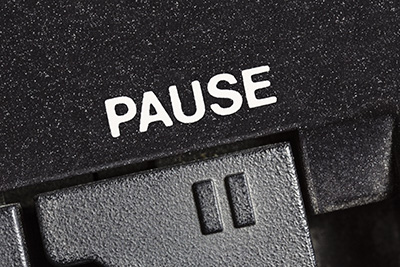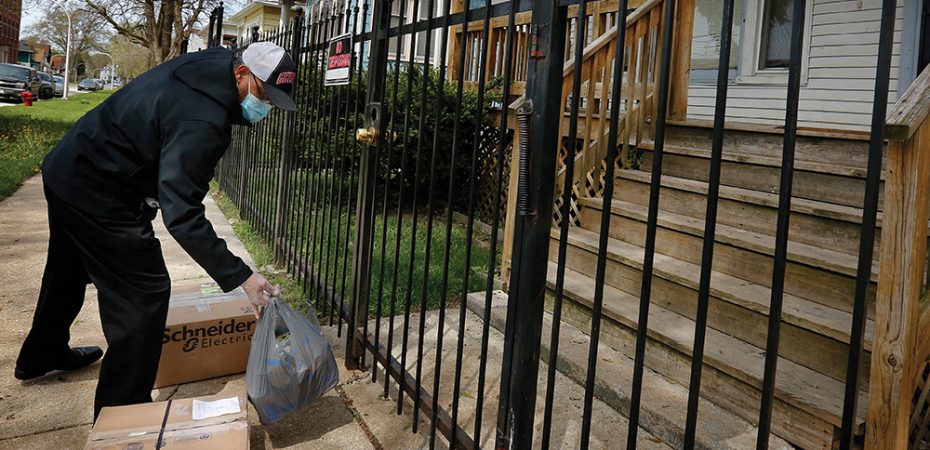Hitting the ‘Pause’ Button
Rebuilding and rethinking our ministry after lockdown
Deacon Greg Kandra Comments Off on Hitting the ‘Pause’ Button
“Don’t it always seem to go /
That you don’t know what you’ve got /
‘Til it’s gone …”
That song from my youth by Joni Mitchell keeps running through my mind as I think what we have all collectively been living through over the last few months.
And it has a special resonance, I think, for so many of us in ministry — in a particular way, deacons. As I write this, I’m in lockdown in New York City. It appears we will be this way for some time to come, possibly for months. It has been a chance to look at my life and ministry in a different and, I hope, creative way. And it’s forced me to ask an important question:
What happens when the life you knew is suddenly interrupted and you have to hit the “pause” button?
Years ago, I met a man who had just started the deacon aspirancy program in his diocese. He was completing his first semester of formation. I asked him how it was going.
“I love it,” he told me enthusiastically. “But you know what’s been really challenging?” He seemed almost embarrassed to bring it up, but then added, sheepishly, “Praying.”
“Praying?” I asked.
He explained: “I’ve always been a guy who does things. I’m used to being busy, doing things, praying with my hands, you know? What I do is my way of praying. But I’ve had to learn how to pray another way.”
I think most deacons can understand exactly what he means. And maybe this pandemic can help us rediscover a vital part of our ministry that we can too easily neglect. I’m speaking of prayer.
A Ministry of Doing
The diaconate, by its very nature, is a ministry of doing. Deacons are rarely still. The deacon is the guy who teaches, preaches, arranges, carries, facilitates, sets up, takes down. He’s perpetually shuttling between the parish and his home, his home and his job. His days are packed with deadlines to meet, classes to prepare, sick people to visit, meetings to attend, questions to answer, phone calls to return, homilies to prepare.
The deacon is, fundamentally, one who serves; at any parish, he is usually in the thick of things. Even the earliest description of diaconal ministry, in the Acts of the Apostles, describes the first seven who served as being men who did things, freeing up the apostles to pray and preach.
Centuries later, it’s still that way. It is only natural that those men who like to keep busy — who don’t like to have idle hands — are attracted to this vocation.
So, when the pandemic struck last spring, a lot of us found ourselves at a loss. What do we do now?
Ministry in Lockdown
After a few days in lockdown in New York City, as the COVID-19 pandemic began to redefine life as we know it, I found a lot of deacons online feeling restless. “Brothers,” one wrote on Facebook, “isn’t there something we should be doing? How can we minister to the people?”
Responses varied. Yes, many agreed, we should be doing something. Making phone calls. Visiting the homebound. Setting up prayer circles. Something. Anything. In time, a lot of these suggestions bore fruit; deacons took it upon themselves to livestream reflections, morning and evening prayer, the Rosary. I ventured out every weekend to serve and preach at Sunday Mass at my parish. Working from home, my online ministry with my blog grew. We deacons found ways to keep ourselves busy.
But, I suggested to one of my diaconal brothers, maybe that’s beside the point.
Maybe, I wrote, we need to use this time to be less busy, to think of it as a time apart — an opportunity to unite ourselves spiritually with so many others around the world who are isolated, separated, cut off from the sacraments for one reason or another.
The Marginalized
Deacons live to minister to those on the margins; maybe, I suggested, this is our moment to pray more deeply and reflect more purposefully on those people who are marginalized by poverty, sickness, persecution, prejudice, hunger or despair. We can’t be with them physically — social distance keeps us apart — but we can be with them spiritually.
And perhaps, too, this moment can help us appreciate more what we are missing. “You don’t know what you’ve got ‘til it’s gone …” The sacraments. Community. A sense of belonging and being connected to the Body of Christ. What does that mean to us? What does it mean to others? How do we live that from a distance?
Lessons in Isolation
In April, Gregory Hillis wrote an insightful and challenging essay for America magazine in which he stated, bluntly, “We’re all monks now.” He spoke with Trappists at the Abbey of Gethsemani in Kentucky, the legendary monastery that was home to Thomas Merton, and found in the cloister some beautiful lessons in their everyday isolation.
“When we are busy with our daily routines and tasks,” he wrote, “it is easy to feel as if we are in control and that the life we are pursuing bestows ultimate meaning. Yet our means of pursuing meaning … leaves us spiritually impoverished as we scurry about, consumed by the busyness of life.”
…………………………………………………………………………………………………………………………………………………….
Prayer Life
Permanent deacons are required to include as part of their daily prayer those parts of the Liturgy of the Hours known as morning and evening prayer. Permanent deacons are obliged to pray for the universal Church. Whenever possible, they should lead these prayers with the community to whom they have been assigned to minister.
— USCCB Complementary Norm related to the Code of Canon Law 276.2,3
…………………………………………………………………………………………………………………………………………………….
He quoted one of the monks, Brother Paul Quenon, who described quarantine as “a chance to get over the fear of solitude and find the actual comfort in being with something that transcends a life scurrying from this to that.”
Hillis’ conclusion: life in lockdown is forcing all of us to live like monks. The question we needed to consider: What are we going to do with this opportunity?
I think the answer for deacons, now and in the months to come, is to continue to seek ways to minister from afar while being even more aware of our ongoing vocation as men of prayer. It’s a moment to remember (as I tell guys so often on retreat) that being a deacon is not about what we do, but about who we are.
Cut Off, but Connected

As deacons right now, we are continuing our lives of service, but in a way many of us never expected. And that, I think, is a good thing. This moment is challenging us to look at our lives through a different lens — to carry out our vocation and carry on the faith quietly, distantly, prayerfully. It is also challenging us to reassess what matters and to rediscover how to live diakonia, in a sense, like monks.
It reminds us that there are many ways to serve, many ways to sacrifice and give and be present to the people of God.
It reminds us, as well, of the world we once knew and that we have, in so many ways, left behind. How will we live and minister after this moment has passed? And what kind of world will we help to rebuild as a result of our time apart?
DEACON GREG KANDRA is the creator of The Deacon’s Bench blog and is the multimedia editor for Catholic Near East Welfare Association (CNEWA).
…………………………………………………………………………………………………………………………………………………….
Spiritual Connection
Last winter, I had the privilege of spending some time visiting a small group of cloistered nuns, the Poor Clares at St. Clare’s Monastery in Sauk Rapids, Minnesota, near Minneapolis. They are generous donors to Catholic Near East Welfare Association (CNEWA), the agency of the Holy See where I work. While traveling through the area with a colleague of mine, we decided to stop by and thank them.
We met with them in a visiting area, with the nuns behind a grill, and we chatted amiably about our work, the weather, New York City, the state of the world. At one point, they asked if we would like to take some rosaries back to New York. We happily accepted the offer, and they passed through to us a large bag of them.
One of the sisters offered to share a rosary she had that was made of rope. I told her I’d love that. She left the room for a moment to see if she had any extras, but came back and said: “I’m sorry, this one that I have is the only one I’ve got. But here. I want you to have it.’
I protested, but she insisted. “I can make another,” she smiled. “Take it. This way, we’ll have a special connection. You can pray for me and I can pray for you.”
It was a beautiful, generous gesture, and I was grateful for the gift. It’s more than a simple souvenir; it is a challenge for me to remember those who are hidden and often forgotten. I pray with that rosary regularly now — and hold in prayer, as well, those kind sisters who are praying for me and praying for the world from behind the walls of their cloister. That rosary reminds me, too, to pray for all who might find themselves separated from the world, people we may not see but who are connected to us by our common humanity.
And I think in a special way of that hardy, cheerful band of sisters. They are cut off from so much — but connected to everything.
…………………………………………………………………………………………………………………………………………………..





